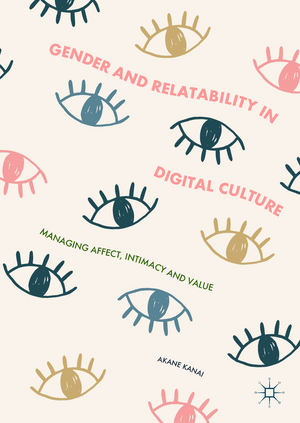Gender and Relatability in Digital Culture: Managing Affect, Intimacy and Value
Autor Akane Kanaien Limba Engleză Hardback – 3 aug 2018
| Toate formatele și edițiile | Preț | Express |
|---|---|---|
| Paperback (1) | 381.21 lei 6-8 săpt. | |
| Springer International Publishing – 26 ian 2019 | 381.21 lei 6-8 săpt. | |
| Hardback (1) | 498.61 lei 6-8 săpt. | |
| Springer International Publishing – 3 aug 2018 | 498.61 lei 6-8 săpt. |
Preț: 498.61 lei
Preț vechi: 586.60 lei
-15% Nou
Puncte Express: 748
Preț estimativ în valută:
95.42€ • 99.25$ • 78.78£
95.42€ • 99.25$ • 78.78£
Carte tipărită la comandă
Livrare economică 12-26 aprilie
Preluare comenzi: 021 569.72.76
Specificații
ISBN-13: 9783319915142
ISBN-10: 3319915142
Pagini: 118
Ilustrații: XI, 195 p. 14 illus., 13 illus. in color.
Dimensiuni: 148 x 210 x 22 mm
Greutate: 0.4 kg
Ediția:1st ed. 2019
Editura: Springer International Publishing
Colecția Palgrave Macmillan
Locul publicării:Cham, Switzerland
ISBN-10: 3319915142
Pagini: 118
Ilustrații: XI, 195 p. 14 illus., 13 illus. in color.
Dimensiuni: 148 x 210 x 22 mm
Greutate: 0.4 kg
Ediția:1st ed. 2019
Editura: Springer International Publishing
Colecția Palgrave Macmillan
Locul publicării:Cham, Switzerland
Cuprins
1. Do you relate to this? Femininity, affective intimate cultures and neoliberalism.- 2. Managing relatability: feeling rules and the practice of moderation.- 3. The classificatory reader: relating to others through digital texts.- 4. Intimacy and value: telling the self through figures.- 5. The practices and politics of a relatable brand.- 6. Relatability, feminism, and the shifting sexual contract.- 7. Ambivalence and attachment: some final reflections.
Notă biografică
Akane Kanai is a lecturer in the School of Media, Film and Journalism at Monash University, Australia.
Textul de pe ultima copertă
This book explores the practices and the politics of relatable femininity in intimate digital social spaces. Examining a GIF-based digital culture on Tumblr, the author considers how young women produce relatability through humorous, generalisable representations of embarrassment, frustration, and resilience in everyday situations. Relatability is examined as an affective relation that offers the feeling of sameness and female friendship amongst young women. However, this relation is based on young women’s ability to competently negotiate the ‘feeling rules’ that govern youthful femininity. Such classed and racialised feeling rules require young women to perfect the performance of normalcy: they must mix self-deprecation with positivity; they must be relatably flawed but not actual ‘failures’. Situated in debates about postfeminism, self-representation and digital identity, this book connects understandings of digital visual culture to gender, race, and class, and neoliberal imperatives to perform the ‘right feelings’.Gender and Relatability in Digital Culture will be of interest to students and scholars across a range of disciplines including gender studies, cultural studies, sociology, and media studies.
Caracteristici
Looks at digital media culture and the ways in which young women and girls relate together through the microblogging site Tumblr Explores questions of self-identity as they pertain to affect, emotion and gender Analyses humorous ‘reaction-GIF’ blogs
